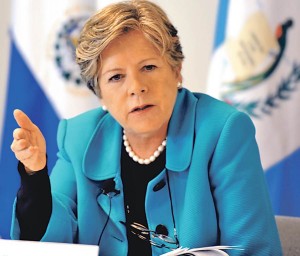
Women cannot be absent from making decisions to help define the development agenda after the year 2015, Economic Commission for Latin America and the Caribbean (ECLAC) Executive Secretary Alicia Bárcena said.
She expressed the view at the commemoration of International Women’s Day on Saturday, March 8.
In a process led by the United Nations, the international community aims to establish a new agenda for sustainable development to succeed the Millennium Development Goals (MDGs), which countries agreed upon in 2000 and committed to achieving by 2015.
Bárcena explained that it is not about “including” women in this new development agenda, but rather “building a development model that is based on equality between men and women and on the eradication of all forms of discrimination”, which is what ECLAC proposes.
“In all areas of debate of the Post-2015 agenda, women should participate at parity with men, which represents an important challenge for Latin America and the Caribbean,” said the highest representative of this regional United Nations organisation.
According to data from ECLAC’s Gender Equality Observatory for Latin America and the Caribbean (OIG), six Latin American and Caribbean countries will be governed by women in 2014: Argentina (Cristina Fernández), Brazil (Dilma Rousseff), Chile (Michelle Bachelet), Costa Rica (Laura Chinchilla), Jamaica (Portia Simpson) and Trinidad and Tobago (Kamla Persad-Bissessar).
Low representation
Nevertheless, women represent no more than 26 per cent of lawmakers, high court justices and Cabinet ministers in the region. They account for 25.6 per cent of City Council members and just 11.7 per cent of mayors. Thirteen Latin American and Caribbean countries had implemented gender quota laws by 2012. In the last three years, only El Salvador (in 2013) joined that group, which demonstrates that there is still a significant number of nations that have not adopted measures to improve the participation of women in electoral politics.
On another point, Bárcena said “the Post-2015 development agenda can’t be limited to reducing poverty, and instead must be seen as a comprehensive process that covers both productive and reproductive arenas”.
This implies, among other things, changing the current patterns of production and consumption – which are not environmentally sustainable – and collectively taking on issues such as unpaid work and the so-called care economy that today mainly falls to women, affecting their development.
According to OIG data, no Latin American country has women in a parity situation with men in terms of economic participation. Five of every 10 women are still outside the job market and unemployment among women is two percentage points higher than among men (7.8 per cent versus 5.9 per cent).
Women’s autonomy is a key factor for guaranteeing they can exercise their human rights in a context of full equality, said ECLAC, underlining three main pillars: physical autonomy (control over their bodies), economic autonomy (the capacity to earn income and generate their own resources), and full participation in making decisions that affect their lives and their group.
The need to strengthen women’s autonomy and their voice inside the debate on the Post-2015 development agenda was highlighted in the Santo Domingo Consensus, approved in October 2013 at the XII Regional Conference on Women in Latin America and the Caribbean, organised by ECLAC in Santo Domingo, The Dominican Republic.



